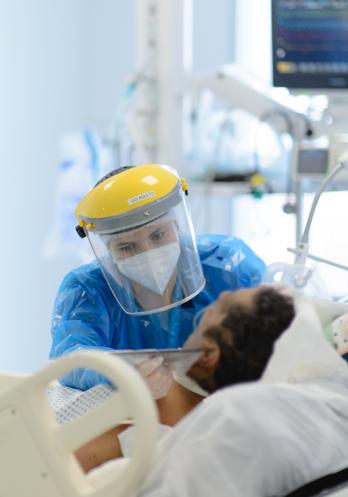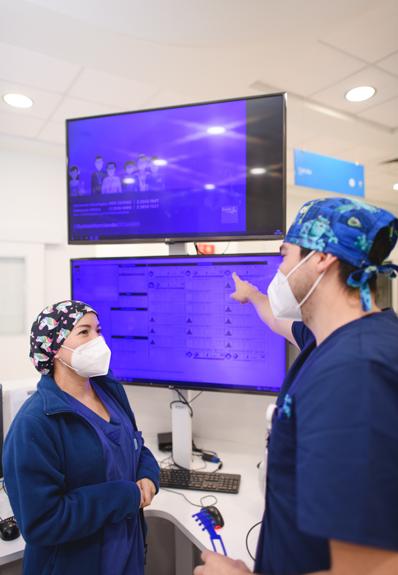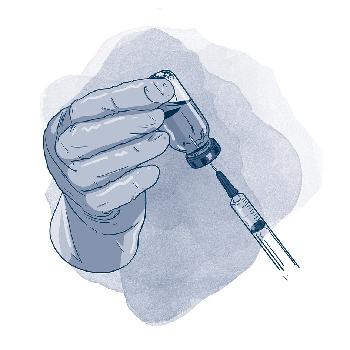
6 minute read
I was lucky to be a nurse
Empathy prevention and care
juan pablo vásquez Nurse Clinical Service
The strange thing about going into a home where there are patients recovering from Covid is that usually you are looking after the medical side, but here it is all about education.
When we take on a patient, we fill in a form, making sure there is always a family member responsible, or a guardian, but that the whole family is present. We tell them how home hospital works and we inform them all together so that they know what to do: What are the alarm signals? When should we notify? When to go to a&e, etc. For each entry we take the name of the family member responsible and we give them a mobile number that is active 24-hours a day.
Covid mainly affects patients’ respiratory system. The second, I would say, is motor-related. They lose a lot of their movement, especially older adults. The third is a difficulty SANTIAGO — CHILE
in swallowing, which happens to patients who spent a long time on a mechanical ventilator. They can’t feed themselves and have to use a tube for a long time, some even using a gastrostomy tube. Those are people who will have to do rehabilitation with specialists. I remember one patient on a ventilator who was transferred to hospital at home. When we got to her home in the ambulance, the family didn’t want to take her in. They begged me to take her back to the hospital, even though we had told them we were coming. They had got a room ready, but they were really afraid. Finally, after talking to them for a long time, they felt comfortable enough for her to be cared for at home. Those are things you don’t expect to happen.
At my house, we have always been really worried, especially about my partner. I also got Covid and spent a couple of weeks in quarantine, but luckily I didn’t get too ill.
As healthcare professionals, we have had to learn to live with the rules and safety measures in order to protect those closest to us. We have got used to it. I think the best way to protect yourself is always information and prevention. We all need to respect the rules and precautions and show respect and empathy for others. �
Communication with the family made all the difference
sarvia mardones Nurse San José de Arica Hospital
ARICA — CHILE
«One of the situations that has impacted me the most is the way that this pandemic has hit our communication with the families, and how our relationships have been disrupted due to isolation. By the same token, I am filled with joy and satisfaction when, after taking the necessary precautions, we have facilitated the communication of patients with their families thanks to the technology available. I went through this experience when my brother Gedeón was admitted to hospital with coronavirus in Santiago, and a fellow nurse helped us get through to him. It definitely made the difference for our family; everything was better after we had news from our brother. Her presence there was not something whimsical or esoteric, instead, it was Our Lord helping us through this difficult time».
We’ll get through this together
alejandro lleixa Healthcare Supervisor Sanitas Healthcare Funding
I work in a healthcare funding department in Barcelona, but for a long time, I worked in the health promotion service in Madrid, which is an online service that includes the 24-hour service for urgent phone calls and video consultations for Sanitas patients. At the start of the pandemic, we were sent home to work. We didn’t really know how things were going to pan out. My old boss asked me for help. She said: You should work on the 24-hour service because you know it well. I helped out by attending calls when the lines were saturated, but my main role was to help to organise, coordinate and support my colleagues from the funding management departments who had volunteered to help out. On a normal day there would be 600 to 700 calls or, when there was a lot of flu around, it would go up to 1200, but now we were getting five or six thousand calls a day at its peak. 90% of the calls are related to Covid.
BARCELONA — SPAIN
At the beginning, there were lots of different questions, but they got more complicated over time. They would ring and ask: What do I have and what should I do? What are the risks? Is this curable, do I have it mildly? And other such questions. Our role was largely to inform and guide. When family members started ringing it got difficult. I remember a young man who was quarantining in his room at home, and nobody wanted to touch anything belonging to him. The young man was really worried about his family: I am almost imprisoned here. We would also get calls from older people with underlying diseases. They were very worried. As coordinator, we started each day with a report of the situation of each hospital; where we could send patients to and where not. For people who were not so bad, we would start by recommending paracetamol, isolation at home and rest. But those who needed hospital we would deal with as quickly as we could. From March to April everything got worse. At the end of April, more or less, that was the worst, really. After the first week of May I was able to go back to my usual work. We weren’t getting any more Covid admissions, but in the last week I worked we started getting new admissions again. At the moment, at the beginning of August, I am on holiday and we are planning to visit my partner’s parents. I believe things are quite quiet. I am from Barcelona and we have another variant that seems to be more difficult to control. I feel like we have tried but we haven’t learned to live with it. We don’t seem to be able to take the necessary precautions and live more or less a normal life at the same time. I think that the last one had to do with education and age range. People over 25 years old are very aware and know how to follow the guidelines, but teenagers are a bit of a problem because a lot of them are carrying the virus but are asymptomatic.


I think the whole system and I have been in nursing twenty years, but the whole of society need to nobody prepares you for this. I believe they are be aware of the gravity and going to start vaccinating in Russia this week or next. Meanwhile, the who is talking about serious nature of the situation 2022. I think it’s more likely to be 2022 than and of how individual the first quarter of 2021. All of it has a certain amount of trial and error to it. Vaccines can behaviour is important, so work on some people and not others. that we can beat this together. I haven’t worried about passing it to my immediate circle, because we have been working from home, but in the end, when you have said the same thing to 50, 60 or 70 people, you get really worried when you see that the virus is still raging. No system is prepared. Sanitas acted well and quickly, but the whole health system has been badly affected. I think the whole system and the whole of society need to be aware of the gravity and serious nature of the situation and of how individual behaviour is important, so that we can beat this together. If we can’t stop the spread, I don’t think it is likely we will be able to go back to a life like we had before. �










